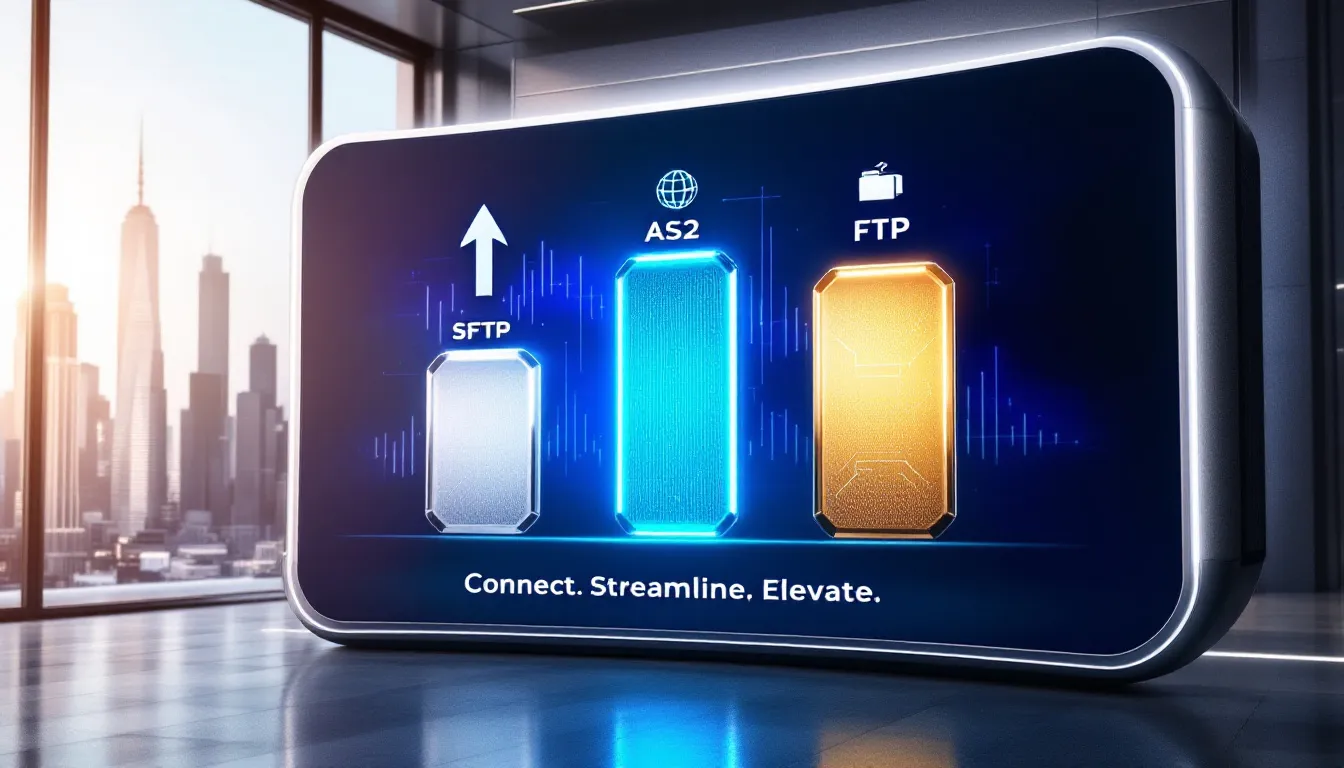AS2: Key Benefits and Best Practices for Secure Data Exchange
Master the art of accounts payables and make your vendors happy.

AS2, or Applicability Statement 2, is a vital protocol for secure data exchange, particularly in electronic data interchange (EDI). Established in 2002, AS2 ensures that sensitive information is transmitted securely over the internet, making it indispensable in sectors like retail and healthcare. This article explains what AS2 is, why it’s important, and offers insights into its benefits and best practices.
Key Takeaways
-
AS2 is a secure protocol for electronic data interchange, utilizing HTTP/HTTPS to transmit EDI messages while ensuring data confidentiality and integrity through encryption and digital signatures.
-
The protocol provides key benefits, including enhanced security, compliance with industry standards, and cost-effectiveness, making it a preferred choice across various sectors such as retail, healthcare, and manufacturing.
-
Successful AS2 implementation requires regular maintenance of digital certificates, effective monitoring and logging, and reliable internet connectivity to ensure uninterrupted secure data exchanges.
Understanding AS2

AS2, which stands for Applicability Statement 2, is a protocol. It is specifically designed for secure and reliable message transmissions over the internet, particularly for electronic data interchange (EDI). Introduced in 2002, AS2 uses HTTP/HTTPS for secure EDI message transmission over the internet, becoming a cornerstone of modern digital communications.
The protocol’s robust security features and versatility have made it indispensable in various industries, ensuring that sensitive data reaches its destination without compromise.
The Basics of AS2
AS2 is a transmission protocol utilizing HTTP or HTTPS for secure EDI message exchange. One of the standout features of AS2 is its ability to handle various file types, including EDI X12, EDIFACT, and XML, making it highly adaptable to different business needs. The protocol wraps data in a secure envelope for transmission over the internet, keeping the data confidential and intact during transfer.
A stable internet connection is necessary for effective AS2 functioning. An AS2 server needs a consistent internet connection to receive transfers without interruption. This reliability is critical for businesses that rely on real-time data exchanges to maintain their operations smoothly.
Importance of AS2 in EDI
Over the past 20 years, AS2 has become the most widely used protocol for EDI. Its adoption is especially prominent in industries such as e-commerce and retail, where secure data exchange is crucial. The protocol’s unified standards for communication, reasonable security level, and cost-effectiveness have made it the go-to solution for businesses looking to streamline their data exchange processes.
AS2 ensures data integrity, confidentiality, and reliability in electronic transactions through its use of digital signatures and Message Disposition Notifications (MDNs). These features help businesses maintain trust and compliance in their digital communications, reducing the risk of data breaches and ensuring that transactions are verifiable and secure.
How AS2 Works

Understanding how AS2 facilitates secure data exchange is key to grasping its inner workings. AS2 operates by creating a secure envelope that enables safe data transmission over the internet. The data must be in EDI or XML format, and the process involves both a server and a client to establish a connection.
Next, we’ll explore the specifics of AS2 message structure, the secure transmission process, and the role of MDNs in reliable communication.
AS2 Message Structure
AS2 messages are meticulously structured to ensure secure data exchange between trading partners. Each AS2 message includes encryption and digital signatures, which verify the authenticity of the sender and maintain data integrity. These messages can also include Message Disposition Notifications (MDNs) that provide proof of receipt, either synchronously or asynchronously.
A critical component of an AS2 message is the digital signature, which ensures that the message has not been altered during transmission. The TO ID in an MDN represents the destination of the AS2 message, further ensuring that the right parties receive the data. This structured approach to message handling is what makes AS2 a reliable choice for secure communications.
Secure Transmission Process
The AS2 protocol is designed to function primarily over secure HTTP (HTTPS). This secure file transfer protocol uses standard encryption algorithms like AES and 3DES to maintain data confidentiality during transmissions. The process begins with the sender encrypting the data and adding a digital signature. The encrypted message is then transmitted over the internet to the receiver’s server, ensuring that the data remains secure throughout the journey.
Upon receiving the encrypted message, the receiver decrypts it using their private key, ensuring that only the intended recipient can access the data. This method of secure transmission not only protects the data from unauthorized access but also ensures that both the sender and receiver can verify the integrity of the message, thereby enhancing the overall security of the communication.
Role of Message Disposition Notifications (MDNs)
MDNs, or Message Disposition Notifications, play a crucial role in the AS2 protocol by acting as electronic receipts that confirm the successful transmission of EDI messages and edi data. These notifications confirm receipt, informing the sender that the message was successfully delivered. The digital signature on the MDN further ensures the authenticity of the sender and verifies the integrity of the message, aiding in non-repudiation.
Using MDNs is critical for maintaining trust and reliability in AS2 communications. They confirm that messages have been delivered and received as intended, providing an additional layer of security and accountability. This makes MDNs an indispensable feature for businesses relying on AS2 for their secure data exchanges.
Key Security Features of AS2

AS2 is known for its robust security features, including data encryption, digital signatures, and mechanisms for non-repudiation. These features not only ensure secure data exchange but also help businesses comply with stringent security standards.
The following subsections will delve deeper into each of these key security features, illustrating how they contribute to the overall security of AS2 communications.
Data Encryption
Strong encryption practices are vital for safeguarding AS2 communications. AS2 uses standard encryption algorithms like AES and 3DES to maintain data confidentiality during transfers. These advanced encryption standards, such as AES-256 and Triple DES, ensure that data remains secure throughout its transmission, protecting it from potential eavesdropping and unauthorized access.
Digital certificates are pivotal in AS2’s encryption process. These certificates, which can be issued by third-party authorities or self-generated, enable secure transmission of data by verifying the authenticity of the sender and ensuring data integrity.
End-to-end encryption in AS2 ensures that sensitive business data remains protected from sending to receiving.
Digital Signatures and Certificates
Digital signatures are integral to AS2’s security, ensuring data integrity and authenticity during transmission. These signatures confirm the message has not been altered and that it originates from a verified sender. AS2 uses digital signatures to authenticate the sender’s identity and maintain data integrity.
Digital certificates, issued by recognized entities or self-generated, are used to share public keys between trading partners. These certificates ensure that the receiving party can verify the sender’s identity and the message’s integrity, providing a secure foundation for AS2 communications. Exchanging digital certificates beforehand enhances the security and reliability of data exchange.
Non-Repudiation
Non-repudiation, a critical security feature of AS2, allows both senders and receivers to verify transactions, preventing disputes over message delivery. A Message Disposition Notification (MDN) in AS2 confirms the delivery and integrity of messages, providing proof of receipt.
The MDN confirms the sender’s authenticity and ensures the message remains untampered, further enforcing non-repudiation. This unique feature of AS2 allows businesses to maintain trust and accountability in their communications, making it an essential tool for secure data exchanges.
Benefits of Using AS2

The AS2 protocol offers numerous benefits, making it a preferred choice for secure data exchanges across various industries. These benefits include enhanced security, compliance with stringent standards, and cost-effectiveness.
The following subsections will explore these advantages in detail, highlighting how AS2 can improve business operations and secure communications.
Enhanced Security
AS2 enhances security through digital signatures, encryption, and receipts, ensuring safe data transmission over the internet. The protocol uses SSL/TLS encryption to protect data during transmission, safeguarding it from eavesdropping and unauthorized access. This secure shell protocol ensures that sensitive information remains confidential and intact throughout its journey.
Digital signatures enable recipients to confirm the sender’s legitimacy and the integrity of the received data, providing extra security. AS2 features hashing algorithms that detect alterations to messages during transit, ensuring data integrity.
The Message Disposition Notification (MDN) acts as an electronic receipt, confirming successful transactions between trading partners and enhancing trust.
Compliance with Standards
AS2’s compliance with various standards set by organizations like the American National Standards Institute (ANSI) makes it suitable for regulated industries. Adhering to stringent data security standards, AS2 helps businesses meet compliance requirements, reducing legal and financial risks. This is particularly beneficial for sectors like healthcare, finance, and retail, where data integrity and security are paramount.
Consistent logging of transaction data details is another critical aspect of AS2 aiding in compliance. Detailed monitoring and logging of AS2 transactions help businesses troubleshoot issues and ensure accurate documentation. This supports regulatory compliance and enhances the overall security and reliability of data exchange.
Cost-Effectiveness
AS2 can significantly reduce costs compared to traditional Value Added Networks (VANs). VANs often come with setup, maintenance, and transaction fees, which can add up quickly. In contrast, AS2 enables direct point-to-point EDI connections, reducing the need for third-party intermediaries and transmission expenses.
AS2 simplifies the electronic data interchange process, making it cost-effective for businesses of all sizes. Leveraging existing internet infrastructure, AS2 minimizes additional investments, enhancing its appeal as a cost-effective alternative to traditional EDI solutions.
Setting Up AS2
Setting up AS2 involves acquiring necessary tools and software, configuring connections, and managing digital certificates.
Here, we’ll guide you through the essential requirements and configurations for effective AS2 implementation, ensuring smooth and secure data exchange.
Required Tools and Software
Setting up AS2 requires specific tools and software, including digital certificates and third-party AS2 tools or self-issued certificates. Third-party certificates are generally more secure than self-issued ones, providing additional security for data exchanges. These certificates promote secure data exchange and help maintain compliance with security standards.
AS2 uses existing internet connections for communication, requiring no additional infrastructure. Tools and credentials, such as AS2 certificates, are essential for establishing secure and reliable AS2 communications.
Configuring AS2 Connections
Configuring AS2 connections requires creating a new connection in the administrator interface and selecting AS2 from the type list. Connection properties must specify the target AS2 server, ensuring data is transmitted to the correct destination.
Testing the AS2 connection ensures proper setup before saving the configuration. This step identifies and resolves any potential issues, ensuring smooth and secure data exchange.
Managing Digital Certificates
Managing digital certificates is crucial for AS2 implementation. Certificates can be self-generated by businesses or obtained from third-party certification authorities. These certificates must be exchanged with trading partners beforehand, whether self-signed or issued by a trusted authority.
Regular updates and renewals of digital certificates prevent disruptions in AS2 communication. Certificates typically last 2 to 5 years, and notifying trading partners of updates at least four weeks in advance helps minimize disruption. Regular certificate maintenance ensures continuous and secure AS2 operations.
Best Practices for AS2 Implementation
Effective AS2 implementation requires adherence to best practices, such as regular certificate maintenance, comprehensive monitoring and logging, and reliable internet connectivity.
Following these practices maximizes the benefits of AS2 and maintains secure and efficient data exchanges.
Regular Certificate Maintenance
Regular updates and validation of digital certificates are critical for maintaining secure AS2 operations. Managing AS2 certificates involves creating, regularly updating, and replacing them to maintain security.
Self-signed certificates can be generated for AS2, allowing users to avoid external Certificate Authorities, but regular updates are still necessary to ensure security.
Monitoring and Logging
Effective monitoring and logging are essential for troubleshooting issues, ensuring compliance, and maintaining data integrity. Regular certificate maintenance avoids disruptions in AS2 operations, impacting monitoring and logging effectiveness.
Reliable internet connectivity is vital for uninterrupted AS2 operations and accurate transaction logging.
Ensuring Reliable Internet Connectivity
Reliable internet access is fundamental for continuous AS2 data transfers without interruptions. Stable internet connectivity is critical to prevent interruptions during AS2 transactions, ensuring smooth data exchange.
Redundant internet connections can prevent AS2 downtime, providing additional reliability.
Comparing AS2 with Other Protocols

AS2 is often compared to other data transfer protocols like SFTP and FTP. Understanding these comparisons helps you make an informed choice about which protocol best suits your business needs.
The following subsections will highlight the differences between AS2 and these other protocols.
AS2 vs. SFTP
AS2 uses TLS/SSL for secure communication and S/MIME for message encryption, while SFTP relies on Secure Shell (SSH) and public/private key encryption for high security. AS2 is primarily used for data transfers requiring proof of receipt, especially in industries with strict data handling requirements. SFTP is often favored for secure and scalable file transfers across various sectors, making it versatile.
Both AS2 and SFTP require considering specific requirements for file and data transfers, influencing the decision on which to use. AS2’s reliance on digital signatures and acknowledgments facilitates non-repudiation, suitable for businesses needing proof of data receipt.
SFTP can help organizations comply with regulations such as HIPAA and GDPR, making it suitable for highly regulated data environments.
AS2 vs. FTP
AS2 has more built-in security provisions, making it significantly more secure than FTP. FTP primarily relies on username and password authentication, which is less secure than AS2’s robust security features. In contrast to AS2, FTP’s primary mode of authentication is through usernames and passwords, which are less secure.
AS2 is often deemed significantly more secure than FTP due to its enhanced security features and protocols. Additionally, AS2 generally incurs lower costs than FTP, particularly within Electronic Data Interchange (EDI) frameworks, making it a more cost-effective solution for businesses.
Use Cases of AS2
AS2 is endorsed by major retailers and has been widely adopted across various industries for secure and efficient data exchange. The following subsections will explore specific use cases of AS2 in the retail industry, healthcare sector, and manufacturing, highlighting the protocol’s versatility and benefits.
Retail Industry
AS2 is widely used in the retail industry to facilitate secure electronic data interchange (EDI) transactions. For example, a large retail chain employs AS2 to transmit purchase orders and invoices to suppliers, ensuring data integrity and security. The benefits of AS2 in retail include enhanced security, improved efficiency in transactions, and reduced operational costs.
By using AS2, retail businesses can ensure that sensitive data shared between partners is transmitted securely and in compliance with industry standards. This helps maintain trust and reliability in business operations, allowing for seamless and secure data exchanges.
Healthcare Sector
In the healthcare sector, AS2 facilitates the safe exchange of sensitive patient records, insurance claims, and billing information. AS2 meets HIPAA security standards, ensuring that healthcare providers can securely transmit patient records and billing information between different entities. This level of security is crucial for maintaining patient confidentiality and ensuring compliance with regulatory requirements.
By employing AS2, healthcare organizations can ensure that sensitive data is transmitted securely, reducing the risk of data breaches and maintaining the integrity of patient information. This not only enhances the security of healthcare communications but also improves operational efficiency.
Manufacturing
Secure data exchange is critical in the manufacturing industry to ensure timely communication and coordination between various stakeholders. AS2 facilitates secure communication and data exchange, enabling manufacturers to streamline operations and improve supply chain efficiency. In the manufacturing sector, AS2 is used for transmitting critical documents like purchase orders, invoices, and shipping notices securely, ensuring all parties have up-to-date information.
By using AS2, manufacturers can enhance their supply chain management, improve workflow, and ensure that all trading partners have access to accurate and timely data. This level of coordination is essential for maintaining efficient and effective manufacturing operations.
Summary
AS2 stands out as a robust and secure protocol for electronic data interchange, providing enhanced security, compliance with standards, and cost-effectiveness. Its widespread adoption across various industries, including retail, healthcare, and manufacturing, underscores its versatility and reliability. By leveraging AS2, businesses can ensure that their data exchanges are secure, efficient, and compliant with regulatory requirements.
In conclusion, AS2 offers a comprehensive solution for secure data exchange, helping businesses streamline their operations and maintain competitive advantage. Whether you are looking to enhance security, improve efficiency, or reduce costs, AS2 provides the tools and features needed to achieve these goals. Embrace AS2 to revolutionize your data exchange processes and secure your business communications.
Frequently Asked Questions
What is AS2?
AS2, or Applicability Statement 2, is a protocol designed for secure and reliable internet-based message transmissions, particularly in the context of electronic data interchange (EDI). It facilitates effective communication and data exchange between businesses.
How does AS2 ensure data security?
AS2 ensures data security by utilizing encryption for confidentiality, digital signatures for authenticity, and Message Disposition Notifications (MDNs) to verify the successful transmission and integrity of messages. This comprehensive approach safeguards data throughout its exchange.
What industries commonly use AS2?
AS2 is primarily utilized in retail, healthcare, and manufacturing industries for secure data exchange and efficient electronic data interchange (EDI) transactions. This establishes it as a critical tool for businesses requiring reliable communication.
How does AS2 compare to other protocols like SFTP and FTP?
AS2 is more secure than FTP due to its enhanced security features, including digital signatures and non-repudiation. It is also preferred over SFTP for data transfers that necessitate proof of receipt and compliance with stringent data handling requirements.
What are the cost benefits of using AS2?
Using AS2 provides significant cost benefits by enabling direct point-to-point EDI connections, which reduces dependence on third-party intermediaries and lowers transmission expenses compared to traditional Value Added Networks (VANs). This can lead to substantial savings for businesses adopting AS2.